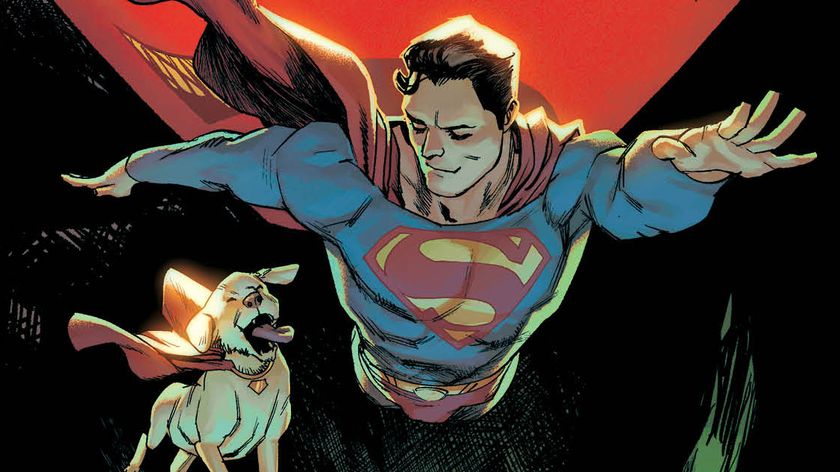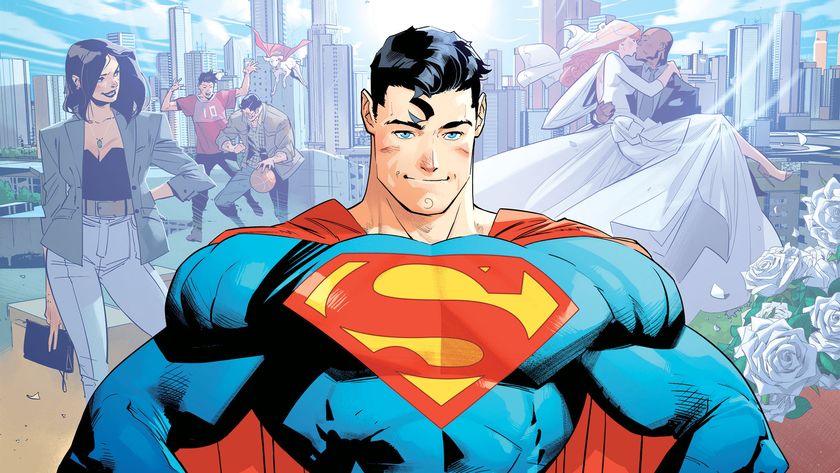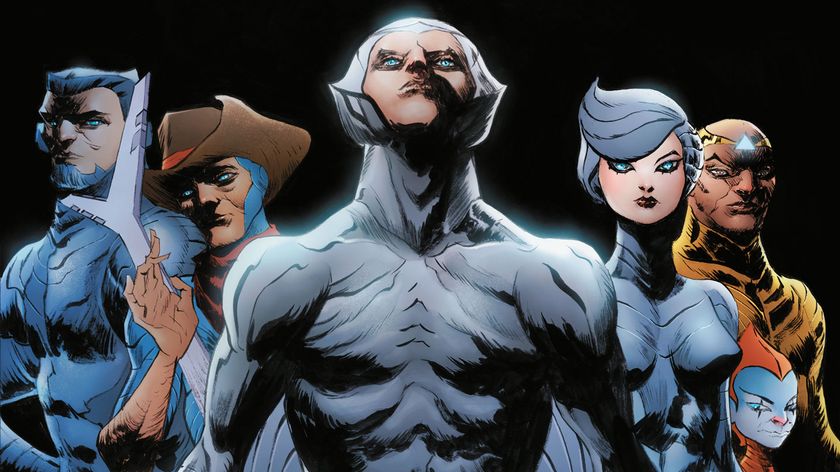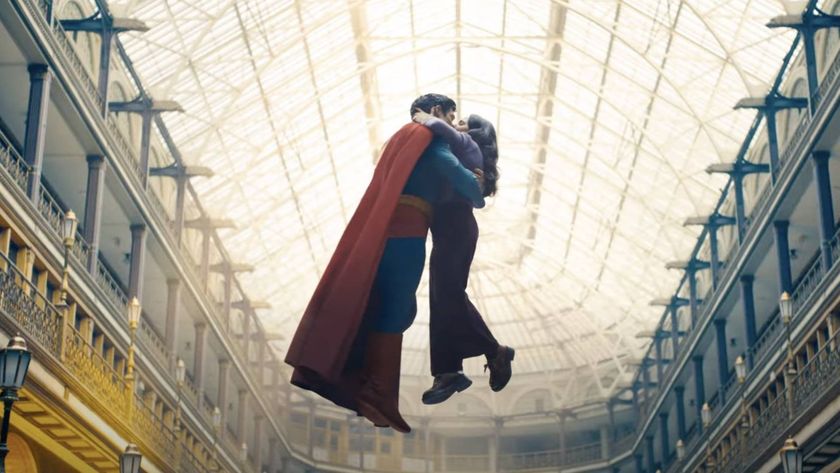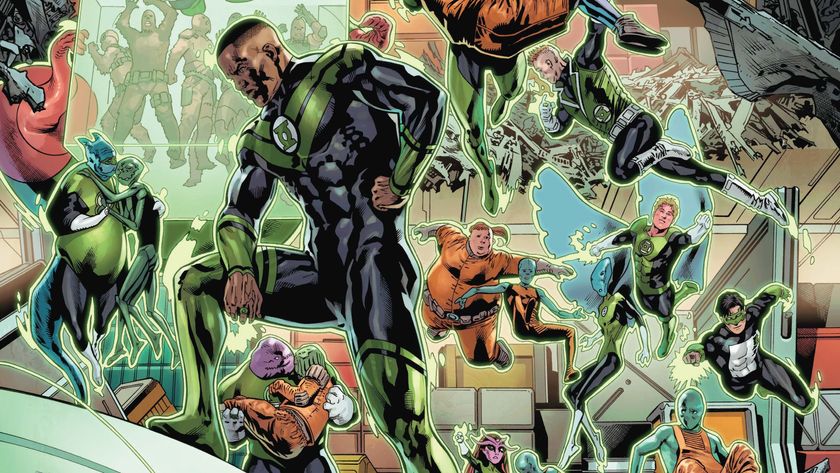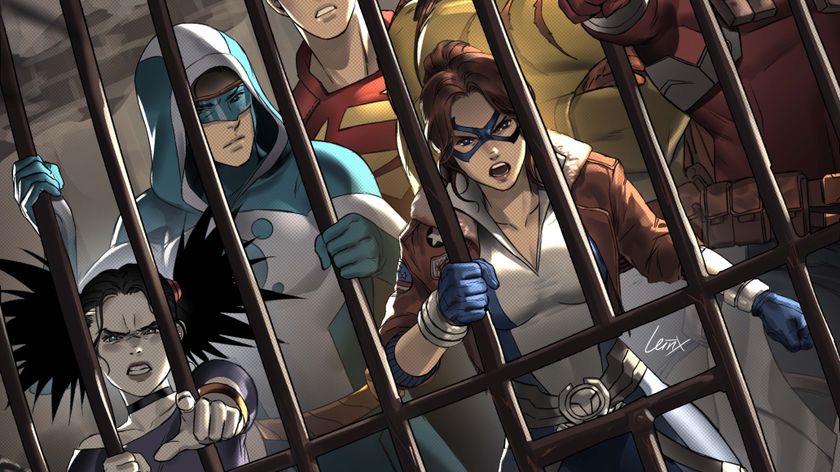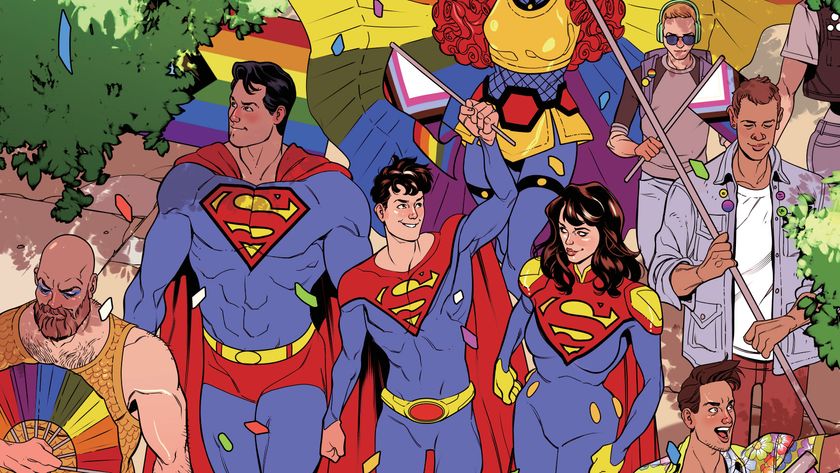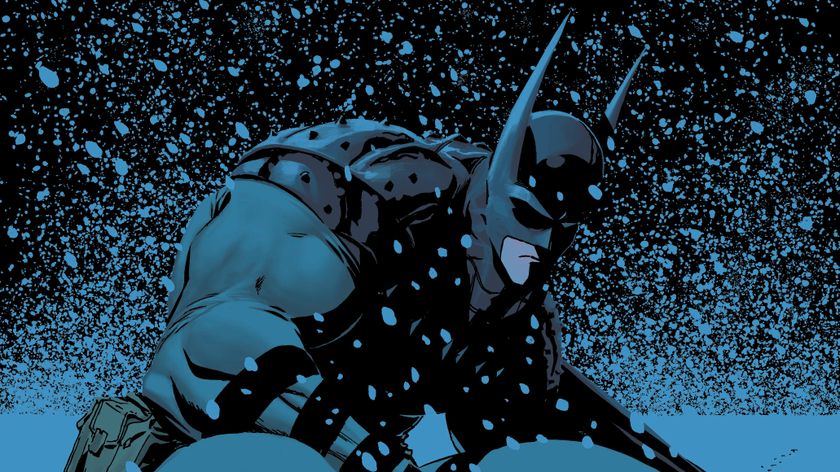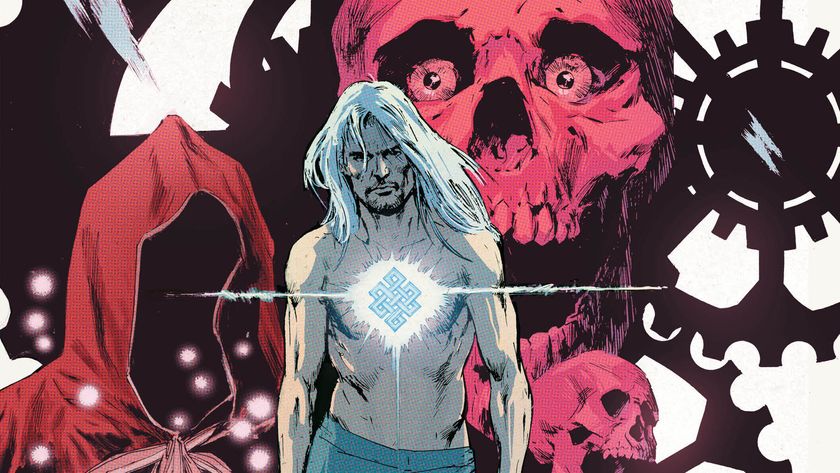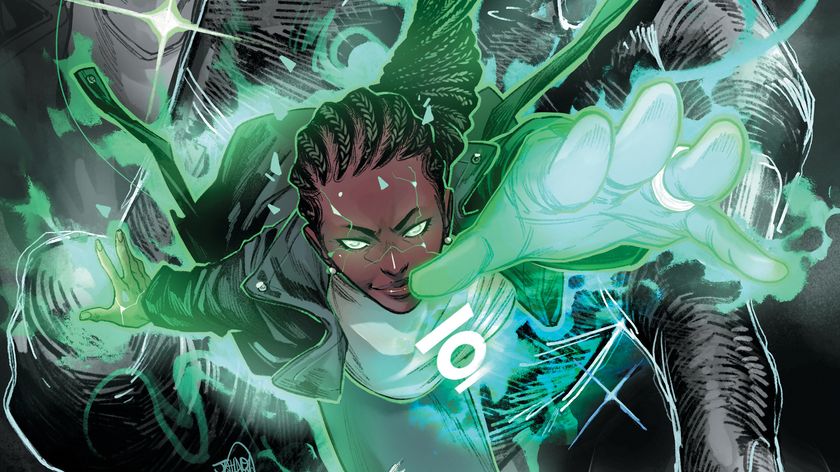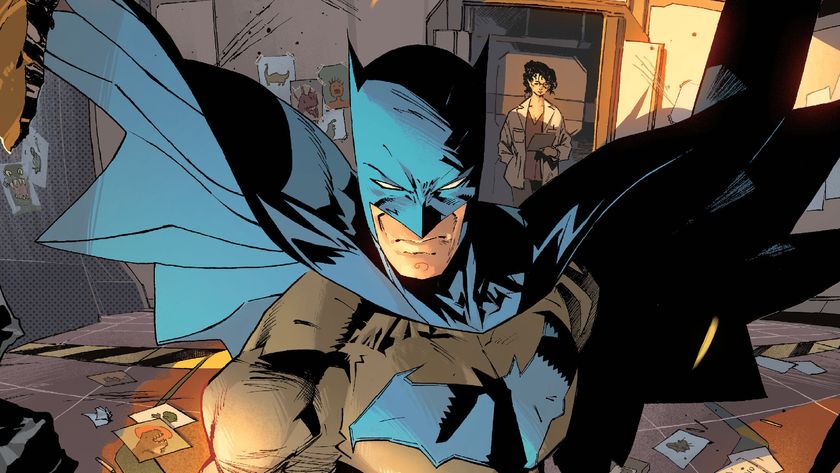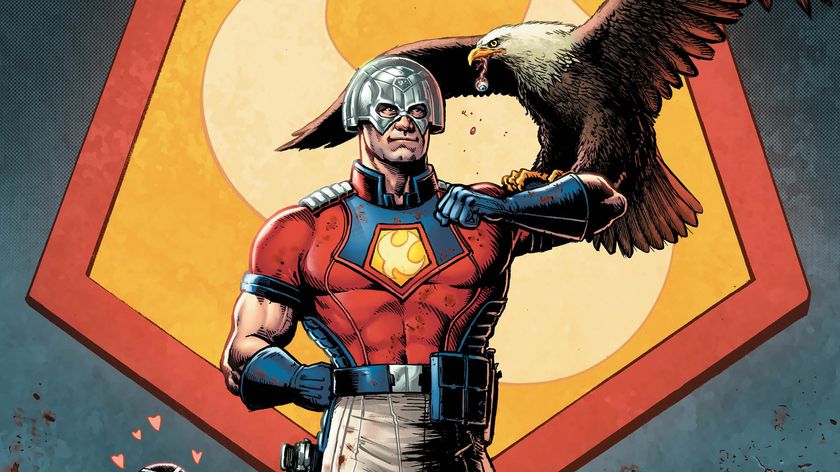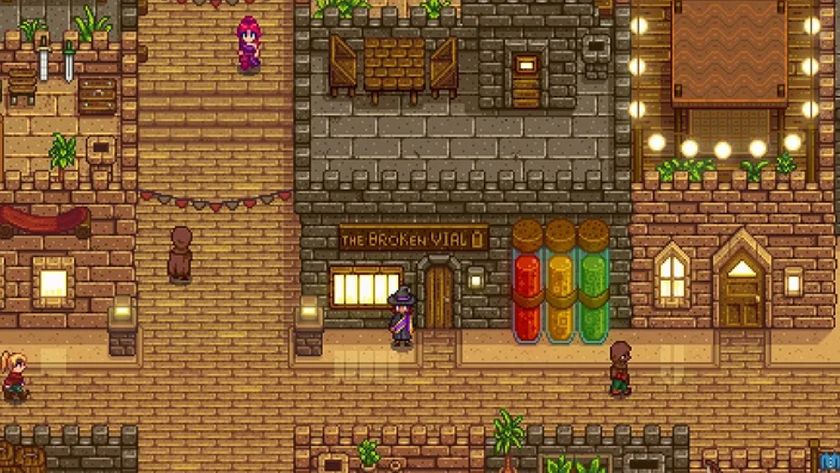Superman: Space Age is historical fiction about 'hope against the backdrop of hopelessness'
Writer Mark Russell and artist Mike Allred reveal what Superman means to them and how they wanted to present him in the new limited series

The DC Universe has seen its fair share of Crises, including the current Dark Crisis, but none are more iconic than 1985's Crisis on Infinite Earths. That's why it's the endpoint for Mark Russell and Mike Allred's Superman: Space Age, a three-part limited series that explores Superman's life in the context of real-world historical events, all leading up to Crisis.
Each graphic novel-length entry in Superman: Space Age explores a different decade of Superman's history, starting with the '60s. As Clark Kent struggles to follow advice from both of his fathers – Jor-El and Jonathan Kent – the world around him approaches a major turning point in which the simple click of a button could change everything.
Ahead of the publication of Superman: Space Age #1 in July, Newsarama spoke with Russell and Allred about Crisis, hope, and what Superman means to them.
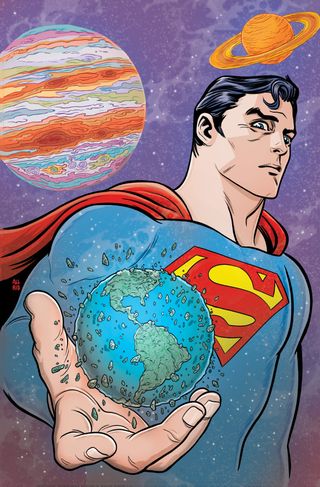
Samantha Puc for Newsarama: Mark and Mike, what inspired you to want to return to Crisis on Infinite Earths?
Mark Russell: It was both the fact that there's a definite end point to the story that the reader knows beforehand, which I always find inspiring as a writer to deal with those sort of limitations, and also, it's very much the story of hope against the backdrop of hopelessness. That was about as hopeless a situation as you can encounter in the DC Universe so that to me seemed like a really good end point for the series.
Nrama: How did you go about researching and refining the historical aspects to make sense for the DC Universe?
Russell: To be honest, I didn't worry too much about the DC Universe part of things. I try to liberate myself from continuity whenever possible, so most of my research was in the history and then saying what I wanted to say about the characters responding to that historical event as a sort of Rorschach print. We see characters like Superman and Lois Lane and Lex Luthor become who we know them to be because they are reacting to historical events. That's what I wanted. These people are not just born fully formed; they're reacting to the world around them. That's what makes them who they are.
Comic deals, prizes and latest news
Get the best comic news, insights, opinions, analysis and more!
Mike Allred: A lot of research, looking for references. I wanted things to be as accurate as possible. I don't know if this is a spoiler, but there's a little bit of the Watergate break-in in [Superman: Space Age], and I actually looked up what the real burglars looked like. So stuff like that. I wanted it to be as authentic as possible.
Nrama: How did you go about figuring out which major character milestones you wanted to include and how did you make those fit against the historical backdrop?
Russell: This was a hard series to write in that regard because I had way more that I wanted to put in than I had room for, but in a way, it was good because it forced me to pick and choose which moments were really important in these characters' development. I think the story gets a lot tighter because I was forced to pick and choose. I started with the history: What are the historical events they would need to respond to that would make these people who they would become? I built the story around those.
I think in a lot of ways, what really makes the story work and pop for me is that – as Mike said in his last response, he did so much research and had so much fidelity to the actual history – when you combine that with the more cosmic and fantastical superhero universe, it really lends it a lot of verisimilitude. You feel that this is a magical place that you can completely believe in. I think that's what I wanted to do, is tell a story about fantastical characters who can never really exist, but in a world that badly needs them.
Allred: I completely agree. I would also add that it's cathartic when you get the feel of the real world and it anchors the story. It becomes cathartic when there's a street-level event or something very simple that Superman can actually have an effect on or actually be helpful. And then you can't help but imagine what that character could do today with the problems we face and how somebody with those abilities could save us. And then, of course, we see the ultimate things he's able to do to save the world. I love it. The balance is incredible.
Nrama: What would you say is your greatest achievement so far in the Superman: Space Age series?
Russell: My greatest achievement is getting out of Mike's way.
Allred: Wow. It's hard to answer a question like that because it forces me to be less than modest. I try to make everything I do be the best thing I've ever done, and I feel like this is the best thing I've ever done. It's just inspired me to really stretch and push and I don't think Brittany Holzherr, our editor, is happy about it because I'm taking longer than I normally would on each page. But it's just become obsessively important to me to make this the best thing I've ever done, and I would like to think I've achieved that.
Russell: My editorial position is just give Mike whatever he needs because the pages are coming out so good. Don't rock that boat.
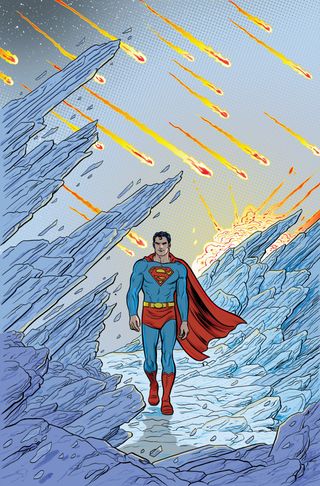
Nrama: Superman represents so many things to so many different people – what does he mean to you, and how did you want to represent him in this series?
Russell: For me, I think Superman started the ultimate thought experiment. 'What would I do if I had that power? What should be done with the power that is in the world?' I think Superman's answer is that you embrace humanity. You make every human being feel like they're special and they matter and they're worth protecting. When people begin to respect themselves that way and begin to see others that way, that's where the real improvements happen – not necessarily because of what he's doing, but because of the attitude, he's inspiring in other people, that we really need the contributions of every human on the planet if we're going to survive this thing.
Allred: Right. There are so many moments where you clearly see that Superman really does care about the individual. He's not above it all. It really is his driving passion. It's why he exists, and it's inspiring.
Nrama: So, we've got three issues–
Allred: Three graphic novels.
Russell: I call them books because I like the majesty of referring to them as books.
Nrama: They're not floppies, by any means. How far along are you in the process for the next two books and how has the story changed as you've progressed through the creation process, if it has?
Russell: For me, the story has changed in that I simplified it. Like I mentioned earlier, I wasn't able to include all of the historical events and character turns I wanted, but I think in a lot of ways that's made it a lot better. It's forced me to really give serious consideration to what's left in there. It allows me to go deeper on things I wouldn't have been able to go as deep on before, and I think it's given the story a lot more gravity than it would have had if I had tried to cram it all in and just been cycling through historical event after historical event without spending too much time on any of them. And I think the story becomes more visual and more epic as it goes along, so the '60s feels a little more intimate than the next two, but I hope we never lose that grounding sense of humanity that I think marks the series.
Allred: I would say there's intimacy throughout, but like Mark said, it does build into this big, epic momentum. The pace of it, the feel of it, the mass of it is phenomenal. I've never approached something this way before, in that each chapter is huge. I had to mentally break it down into 20-page bites like I would a monthly series so that it was digestible. Getting that huge feeling to be consistent throughout so you feel the passage of time, you feel the eras going past. Even breaking down a decade like the '70s, so many things changed. And being close to rounding the corner, I'm very happy with how it has that 'ramping up' vibe.
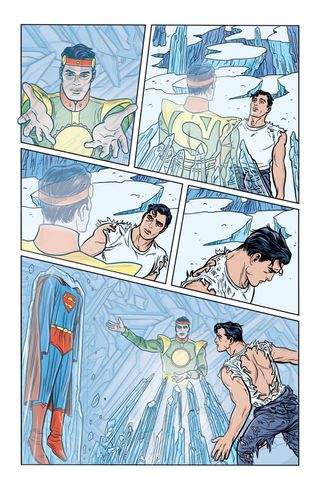
Nrama: Without giving too much away, what can readers expect from the series?
Russell: I'll give you a couple of little teasers. In the '70s issue, Watergate and the burning Bronx – the torching of buildings in New York, or in this case, Gotham – become really central to the story. And also, in the '80s, obviously, the Crisis on Infinite Earths comes into play. The further we get into the story, the more the history becomes infused with the mythology of the DC Universe.
Allred: I'd like to let people know that Superman is by far the star. This is his book. But there are so many great moments with other Justice Leaguers. You see the formation of the Justice League. Batman has so many fantastic moments, he almost steals the book at times. That's surprising! I don't think that's a spoiler, because you won't know how that happens. And there are also some incredibly moving moments with other superhero characters that sneak up on you and really get you in the gut. I would really want people to know that there is so much more depth in this than what you might get from a cover or a few preview pages.
Nrama: Aside from the difficulty of narrowing it down, what do you feel has been the greatest challenge in executing the concept for Superman: Space Age?
Russell: It's been keeping it within 240 pages. I feel like the story could have been twice as long. But also, just picking and choosing what to really focus on and trying to do justice to the things I choose to include in the story is really the challenge. I don't want to include something unless it really needs to be there, and then if it needs to be there, I really want it to feel like you could read just that part of the story and come away with something.
Allred: Right, if you just imagine the history of Superman – obviously, he shows up in the late '30s – but if you just took the stories that were told in the '60s, '70s, and '80s, and then of course the significant historical events that have happened in the real world in those decades, you could see the challenge of what Mark was presenting. Then you might also ask yourself, 'Well, why the '60s, '70s, and '80s?' That's what I asked myself when it was first offered to me. Why those three specific decades? What would go beyond that? When you read the book, you'll see exactly why, and it's brilliant.
Nrama: Is there anything you'd like to add?
Russell: I just want to say this has been a high point in my career to even be able to work on something like this, and I'm at once both grateful and amazed that I was given this opportunity.
Allred: I have to second that. It's a dream come true. He is the guy! You can't be presented with a more iconic character, and if somebody were to ask me, 'Hey, what would you want to do with a Superman book?' Unless I had several years to do a run on a Superman series, which isn't really possible the way I work and the way I jump around, this is it. This is exactly what I want to do. This is my big bite of the Superman pie, and it's delicious.
Superman: Space Age #1 goes on sale July 26.
Lex Luthor is one of the best Superman villains.

Samantha Puc (she/they) is an editor at Newsarama and an avid comics fan. Their writing has been featured on Refinery29, Bitch Media, them., The Beat, The Mary Sue, and elsewhere. She is currently pursuing a Master of Fine Arts degree in creative nonfiction at The New School.
